
AI-Resume-Analyzer-and-LinkedIn-Scraper-using-LLM
Developed an AI application using LLM to analyze user resumes and provided the summarization, strengths, weaknesses, suggestions, suitable job titles, and also scraping job details from LinkedIn using Selenium. This application reduces time by 30% and helps candidates tailor their resumes effectively.
Stars: 122
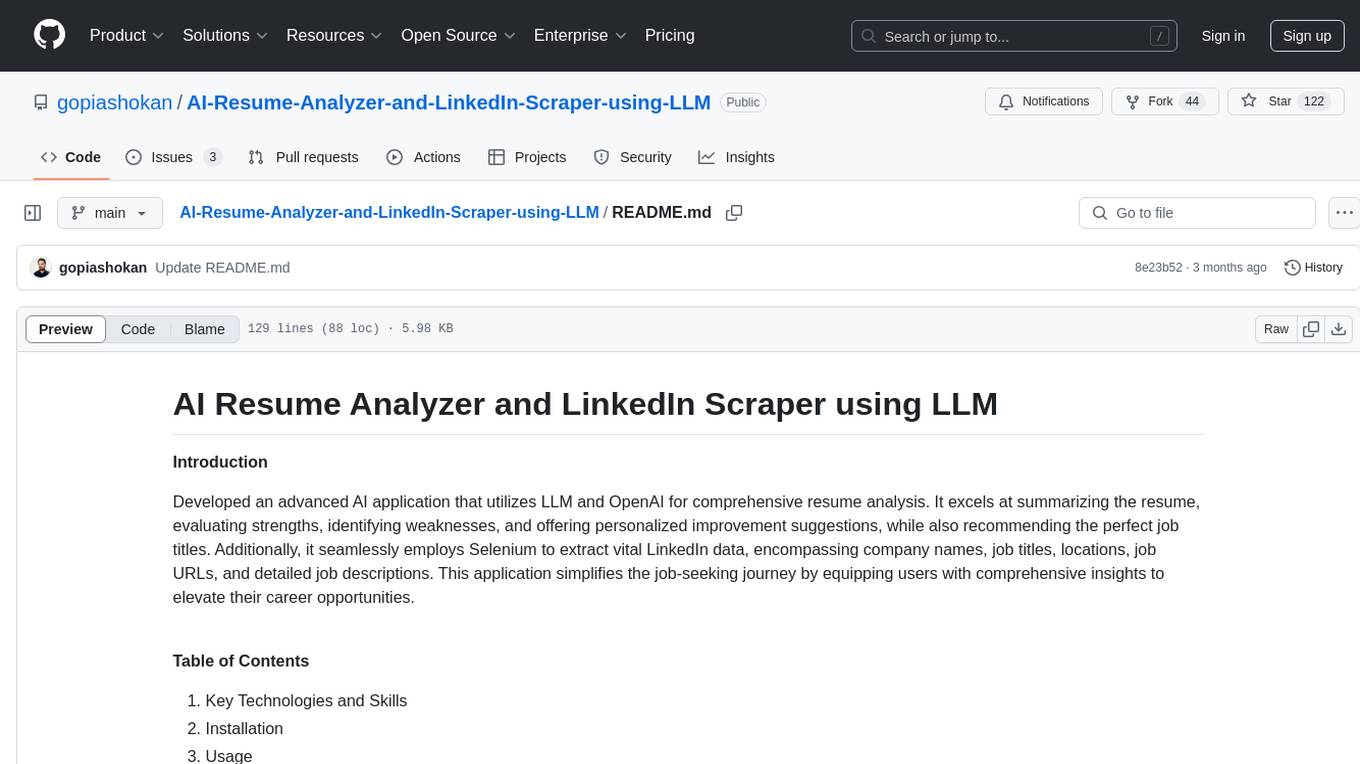
Developed an advanced AI application that utilizes LLM and OpenAI for comprehensive resume analysis. It excels at summarizing the resume, evaluating strengths, identifying weaknesses, and offering personalized improvement suggestions, while also recommending the perfect job titles. Additionally, it seamlessly employs Selenium to extract vital LinkedIn data, encompassing company names, job titles, locations, job URLs, and detailed job descriptions. This application simplifies the job-seeking journey by equipping users with comprehensive insights to elevate their career opportunities.
README:
Introduction
Developed an advanced AI application that utilizes LLM and OpenAI for comprehensive resume analysis. It excels at summarizing the resume, evaluating strengths, identifying weaknesses, and offering personalized improvement suggestions, while also recommending the perfect job titles. Additionally, it seamlessly employs Selenium to extract vital LinkedIn data, encompassing company names, job titles, locations, job URLs, and detailed job descriptions. This application simplifies the job-seeking journey by equipping users with comprehensive insights to elevate their career opportunities.
Table of Contents
- Key Technologies and Skills
- Installation
- Usage
- Features
- Contributing
- License
- Contact
Key Technologies and Skills
- Python
- NumPy
- Pandas
- LangChain
- LLM
- OpenAI
- Selenium
- Streamlit
- Hugging Face
- AWS
Installation
To run this project, you need to install the following packages:
pip install numpy
pip install pandas
pip install streamlit
pip install streamlit_option_menu
pip install streamlit_extras
pip install PyPDF2
pip install langchain
pip install openai
pip install tiktoken
pip install faiss-cpu
pip install seleniumUsage
To use this project, follow these steps:
- Clone the repository:
https://github.com/gopiashokan/AI-Powered-Resume-Analyzer-and-LinkedIn-Scraper-with-Selenium.git - Install the required packages:
pip install -r requirements.txt - Run the Streamlit app:
streamlit run app.py - Access the app in your browser at
http://localhost:8501
Features
Easy User Experience:
- Resume Analyzer AI makes it easy for users. You can upload your resume and enter your OpenAI API key without any hassle. The application is designed to be user-friendly so that anyone can use its powerful resume analysis features.
- It also uses the PyPDF2 library to quickly extract text from your uploaded resume, which is the first step in doing a thorough analysis.
Smart Text Analysis with Langchain:
- What makes it special is how it analyzes text. It uses a smart method called the Langchain library to break long sections of text from resumes into smaller chunks, making them more meaningful.
- This clever technique improves the accuracy of the resume analysis, and it gives users practical advice on how to enhance their job prospects.
Enhanced OpenAI Integration with FAISS:
- Seamlessly connecting to OpenAI services, the application establishes a secure connection using your OpenAI API key. This integration forms the basis for robust interactions, facilitating advanced analysis and efficient information retrieval.
- It uses the FAISS(Facebook AI Similarity Search) library to convert both the text chunks and query text data into numerical vectors, simplifying the analysis process and enabling the retrieval of pertinent information.
Intelligent Chunk Selection and LLM:
- Utilizing similarity search, Resume Analyzer AI compares the query and chunks, enabling the selection of the top 'K' most similar chunks based on their similarity scores.
- Simultaneously, the application creates an OpenAI object, particularly an LLM (Large Language Model), using the ChatGPT 3.5 Turbo model and your OpenAI API key.
Robust Question-Answering Pipeline:
- This integration establishes a robust question-answering (QA) pipeline, making use of the load_qa_chain function, which encompasses multiple components, including the language model.
- The QA chain efficiently handles lists of input documents (docs) and a list of questions (chunks), with the response variable capturing the results, such as answers to the questions derived from the content within the input documents.
Comprehensive Resume Analysis:
- Summary: Resume Analyzer AI provides a quick, comprehensive overview of resumes, emphasizing qualifications, key experience, skills, projects, and achievements. Users can swiftly grasp profiles, enhancing review efficiency and insight.
- Strength: Effortlessly conducting a comprehensive resume review, it analyzes qualifications, experience, and accomplishments. It subsequently highlights strengths, providing job seekers with a competitive edge.
- Weakness: AI conducts thorough analysis to pinpoint weaknesses and offers tailored solutions for transforming them into strengths, empowering job seekers.
- Suggestion: AI provides personalized job title recommendations that align closely with the user's qualifications and resume content, facilitating an optimized job search experience.
🚀 Streamlit application: https://huggingface.co/spaces/gopiashokan/Resume-Analyzer-AI
Selenium-Powered LinkedIn Data Scraping:
- Utilizing Selenium and a Webdriver automated test tool, this feature enables users to input job titles, automating the data scraping process from LinkedIn. The scraped data includes crucial details such as company names, job titles, locations, URLs, and comprehensive job descriptions.
- This streamlined process enables users to easily review scraped job details and apply for positions, simplifying their job search and application experience.
🎥 Project Demo Video: https://youtu.be/wFouWeK7NPg
Contributing
Contributions to this project are welcome! If you encounter any issues or have suggestions for improvements, please feel free to submit a pull request.
License
This project is licensed under the MIT License. Please review the LICENSE file for more details.
Contact
📧 Email: [email protected]
🌐 LinkedIn: linkedin.com/in/gopiashokan
For any further questions or inquiries, feel free to reach out. We are happy to assist you with any queries.
For Tasks:
Click tags to check more tools for each tasksFor Jobs:
Alternative AI tools for AI-Resume-Analyzer-and-LinkedIn-Scraper-using-LLM
Similar Open Source Tools

AI-Resume-Analyzer-and-LinkedIn-Scraper-using-LLM
Developed an advanced AI application that utilizes LLM and OpenAI for comprehensive resume analysis. It excels at summarizing the resume, evaluating strengths, identifying weaknesses, and offering personalized improvement suggestions, while also recommending the perfect job titles. Additionally, it seamlessly employs Selenium to extract vital LinkedIn data, encompassing company names, job titles, locations, job URLs, and detailed job descriptions. This application simplifies the job-seeking journey by equipping users with comprehensive insights to elevate their career opportunities.
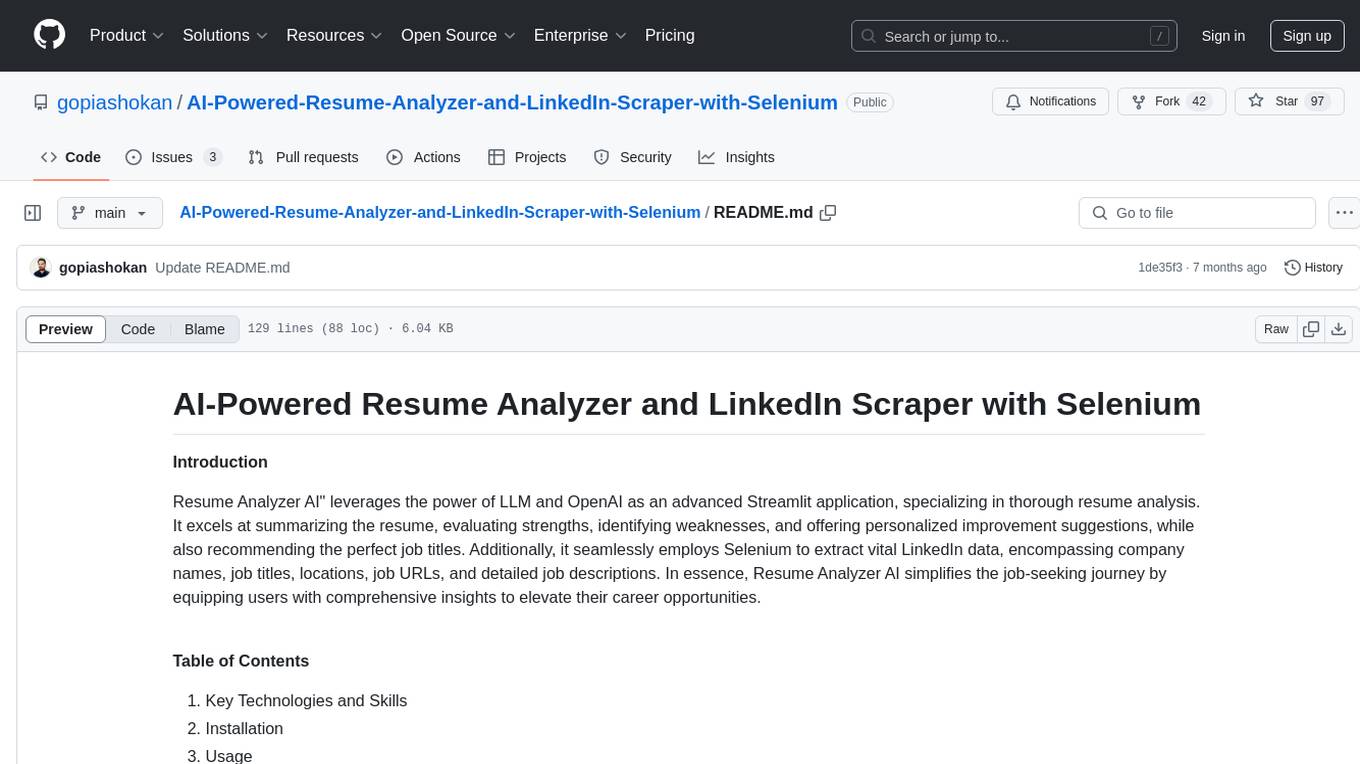
AI-Powered-Resume-Analyzer-and-LinkedIn-Scraper-with-Selenium
Resume Analyzer AI is an advanced Streamlit application that specializes in thorough resume analysis. It excels at summarizing resumes, evaluating strengths, identifying weaknesses, and offering personalized improvement suggestions. It also recommends job titles and uses Selenium to extract vital LinkedIn data. The tool simplifies the job-seeking journey by providing comprehensive insights to elevate career opportunities.
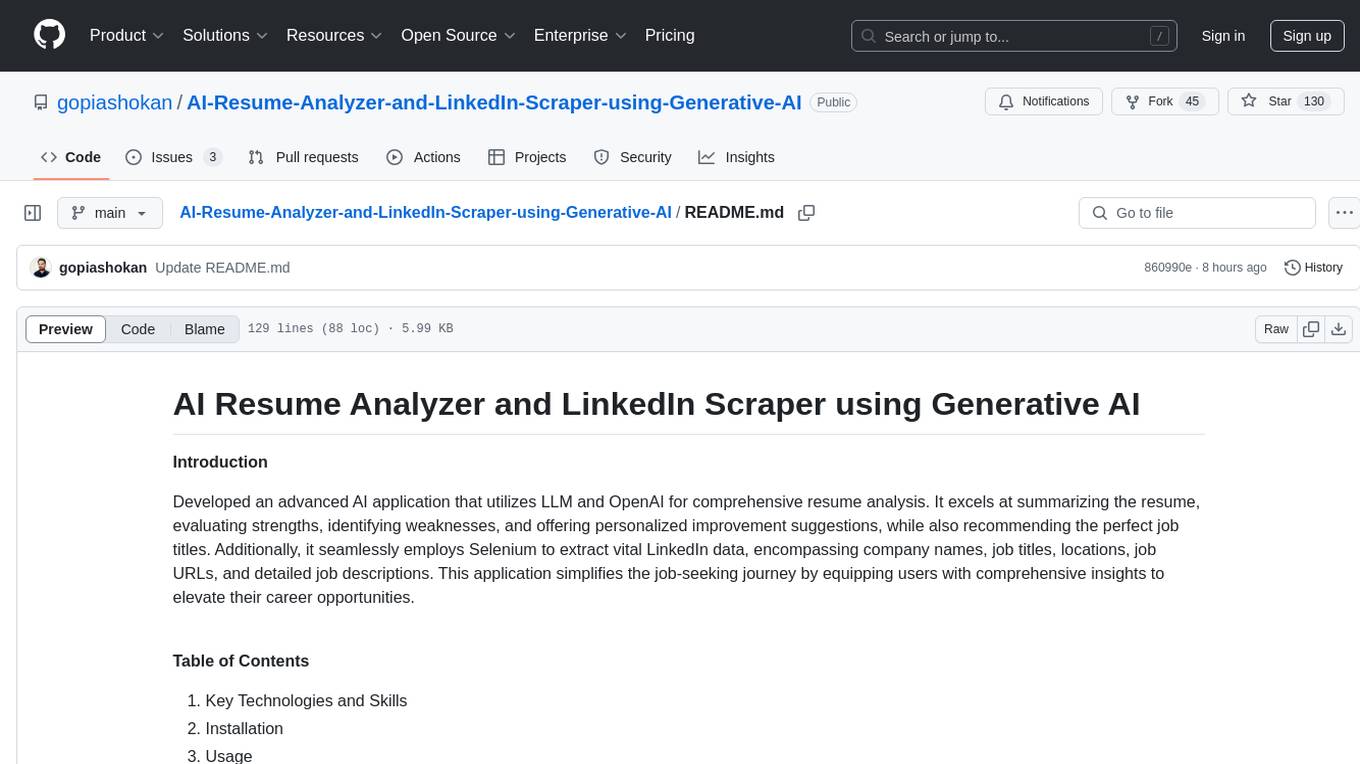
AI-Resume-Analyzer-and-LinkedIn-Scraper-using-Generative-AI
Developed an advanced AI application that utilizes LLM and OpenAI for comprehensive resume analysis. It excels at summarizing the resume, evaluating strengths, identifying weaknesses, and offering personalized improvement suggestions, while also recommending the perfect job titles. Additionally, it seamlessly employs Selenium to extract vital LinkedIn data, encompassing company names, job titles, locations, job URLs, and detailed job descriptions. This application simplifies the job-seeking journey by equipping users with comprehensive insights to elevate their career opportunities.
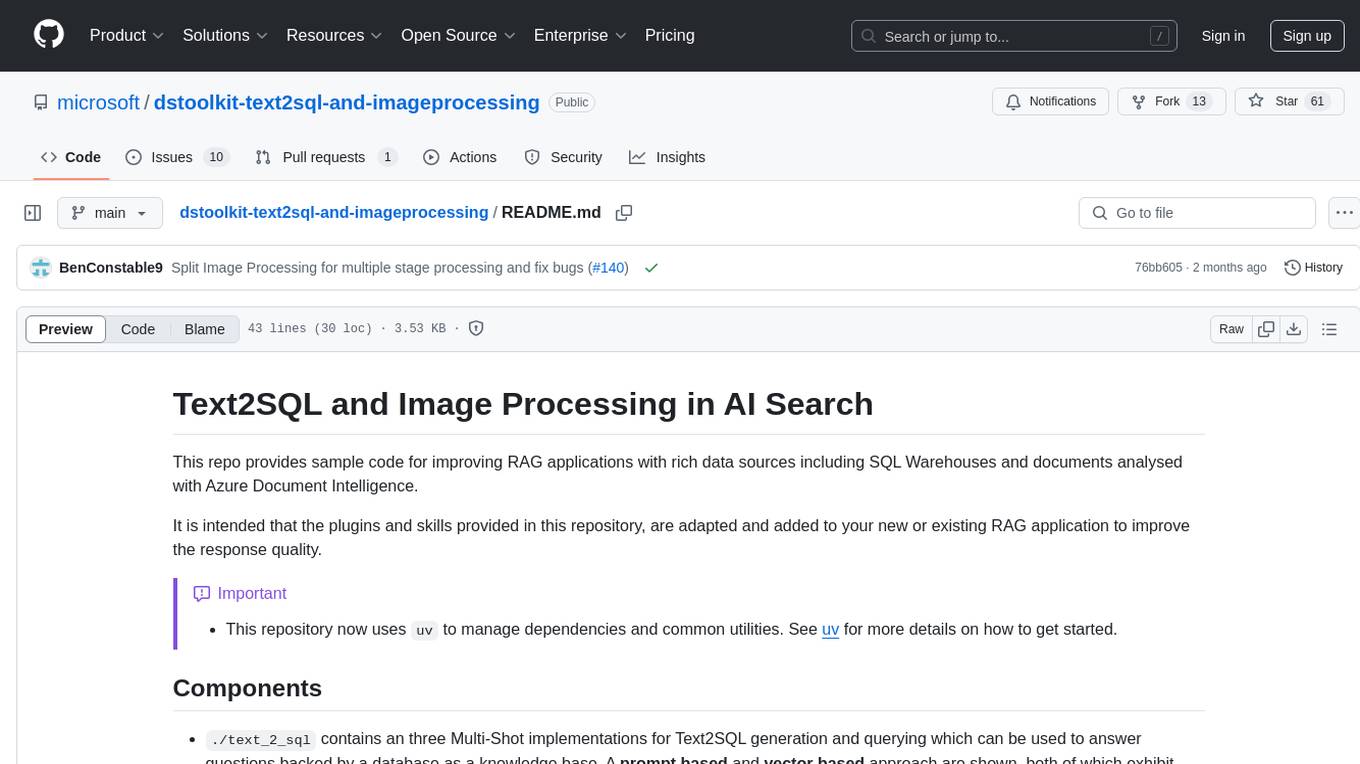
dstoolkit-text2sql-and-imageprocessing
This repository provides sample code for improving RAG applications with rich data sources including SQL Warehouses and documents analysed with Azure Document Intelligence. It includes components for Text2SQL generation and querying, linking Azure Document Intelligence with AI Search for processing complex documents, and deploying AI search indexes. The plugins and skills aim to enhance response quality in RAG applications by accessing and pulling data from SQL tables, drawing insights from complex charts and images, and intelligently grouping similar sentences.
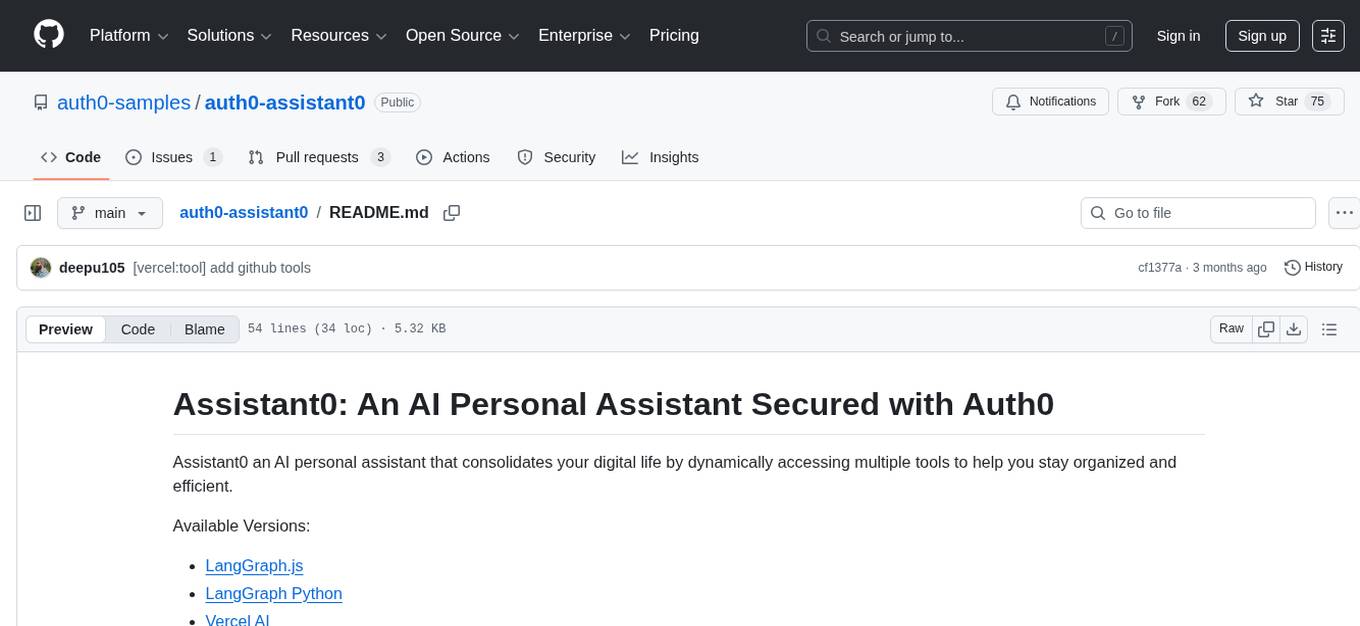
auth0-assistant0
Assistant0 is an AI personal assistant that consolidates digital life by accessing multiple tools to help users stay organized and efficient. It integrates with Gmail for email summaries, manages calendars, retrieves user information, enables online shopping with human-in-the-loop authorizations, uploads and retrieves documents, lists GitHub repositories and events, and soon provides Slack notifications and Google Drive access. With tool-calling capabilities, it acts as a digital personal secretary, enhancing efficiency and ushering in intelligent automation. Security challenges are addressed by using Auth0 for secure tool calling with scoped access tokens, ensuring user data protection.
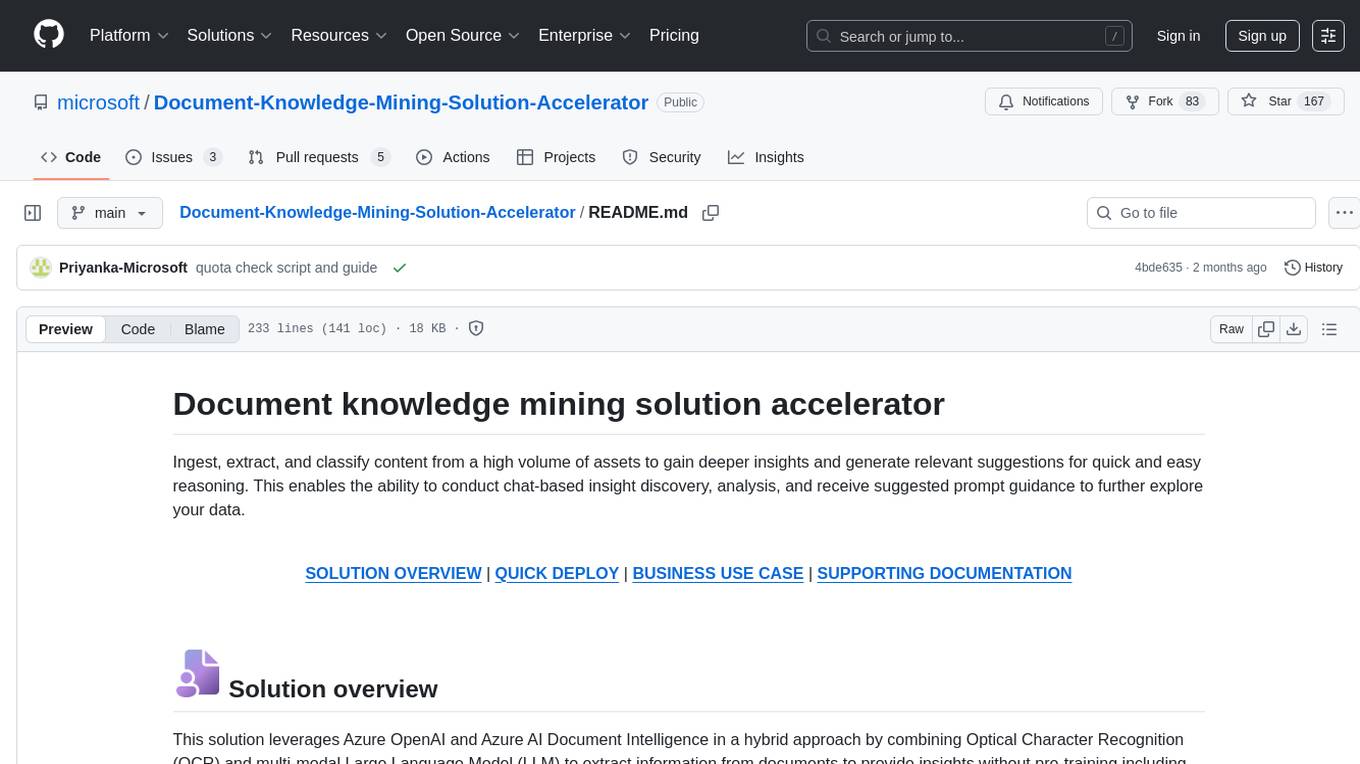
Document-Knowledge-Mining-Solution-Accelerator
The Document Knowledge Mining Solution Accelerator leverages Azure OpenAI and Azure AI Document Intelligence to ingest, extract, and classify content from various assets, enabling chat-based insight discovery, analysis, and prompt guidance. It uses OCR and multi-modal LLM to extract information from documents like text, handwritten text, charts, graphs, tables, and form fields. Users can customize the technical architecture and data processing workflow. Key features include ingesting and extracting real-world entities, chat-based insights discovery, text and document data analysis, prompt suggestion guidance, and multi-modal information processing.
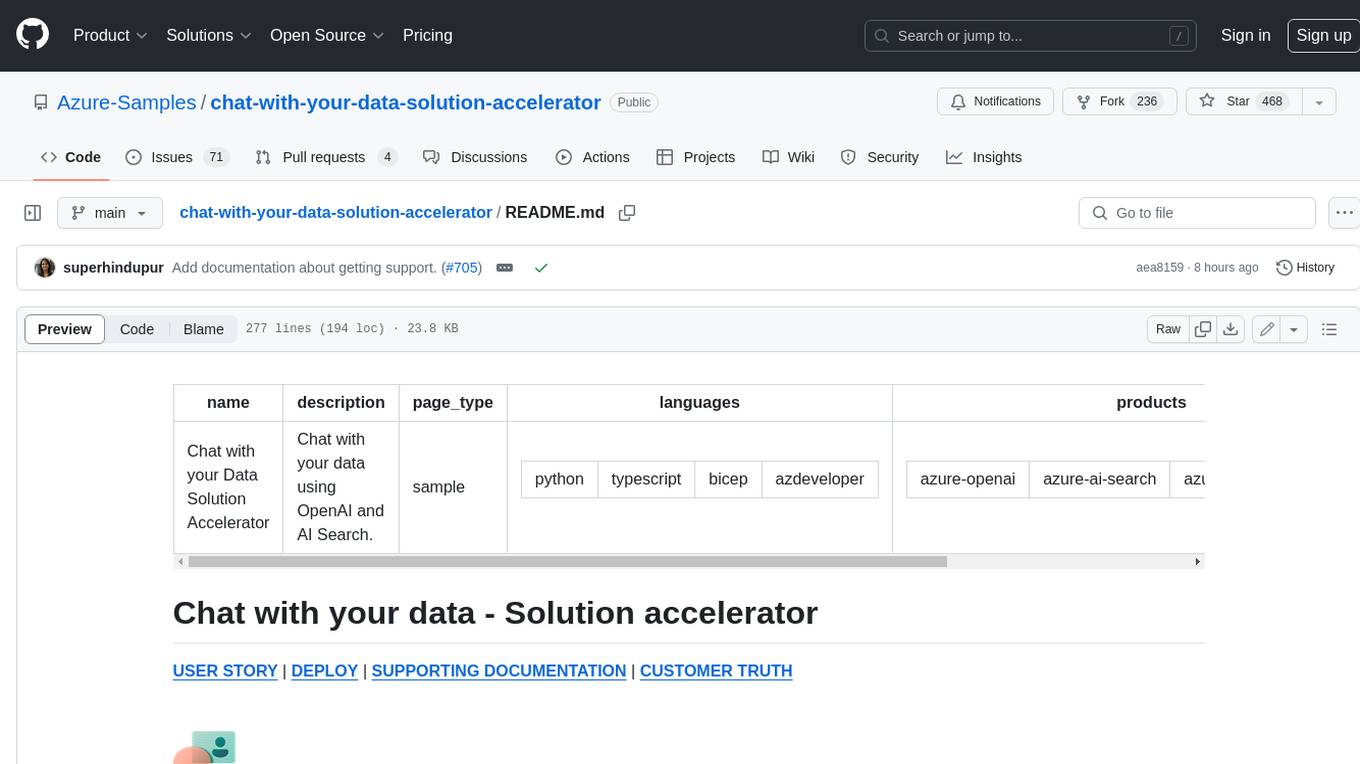
chat-with-your-data-solution-accelerator
Chat with your data using OpenAI and AI Search. This solution accelerator uses an Azure OpenAI GPT model and an Azure AI Search index generated from your data, which is integrated into a web application to provide a natural language interface, including speech-to-text functionality, for search queries. Users can drag and drop files, point to storage, and take care of technical setup to transform documents. There is a web app that users can create in their own subscription with security and authentication.
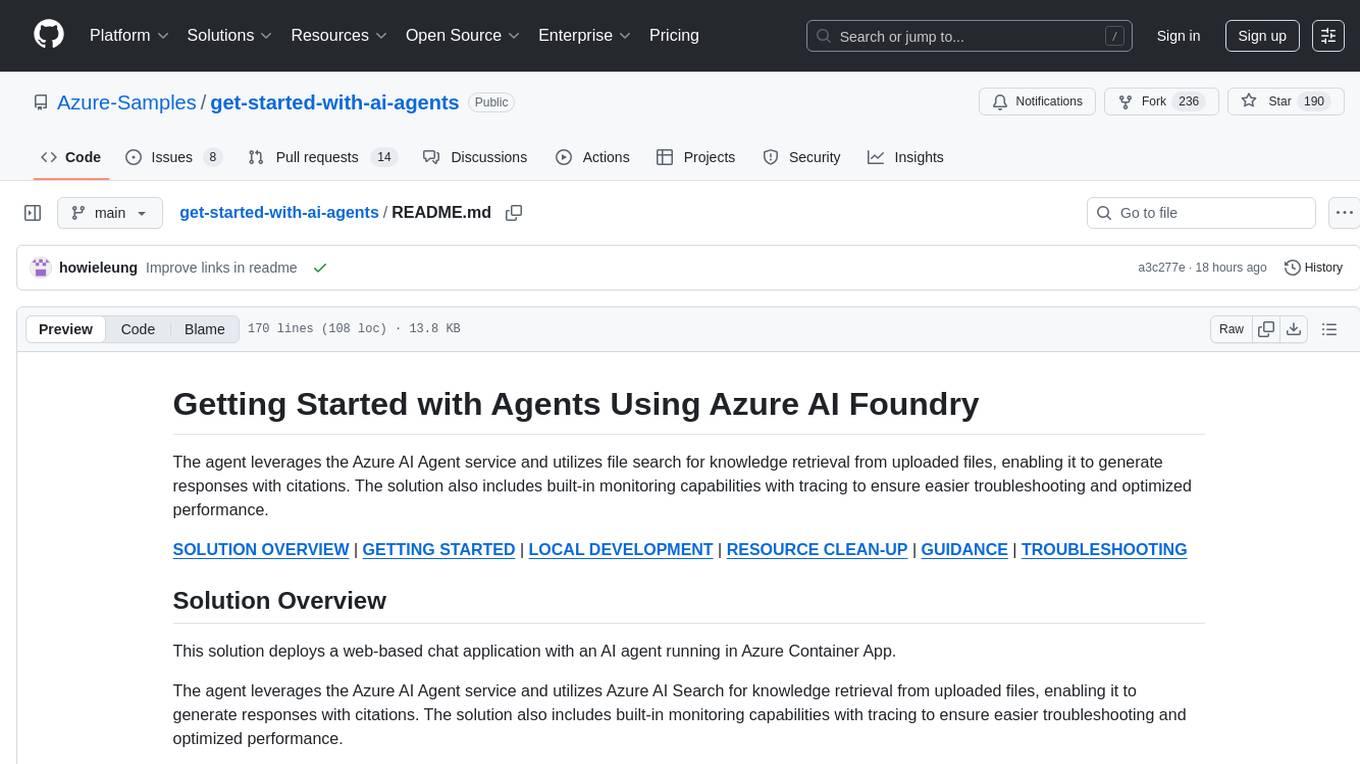
get-started-with-ai-agents
The 'Getting Started with Agents Using Azure AI Foundry' repository provides a solution that deploys a web-based chat application with an AI agent running in Azure Container App. The agent leverages Azure AI services for knowledge retrieval from uploaded files, enabling it to generate responses with citations. The solution includes built-in monitoring capabilities for easier troubleshooting and optimized performance. Users can deploy AI models, customize the agent, and evaluate its performance. The repository offers flexible deployment options through GitHub Codespaces, VS Code Dev Containers, or local environments.
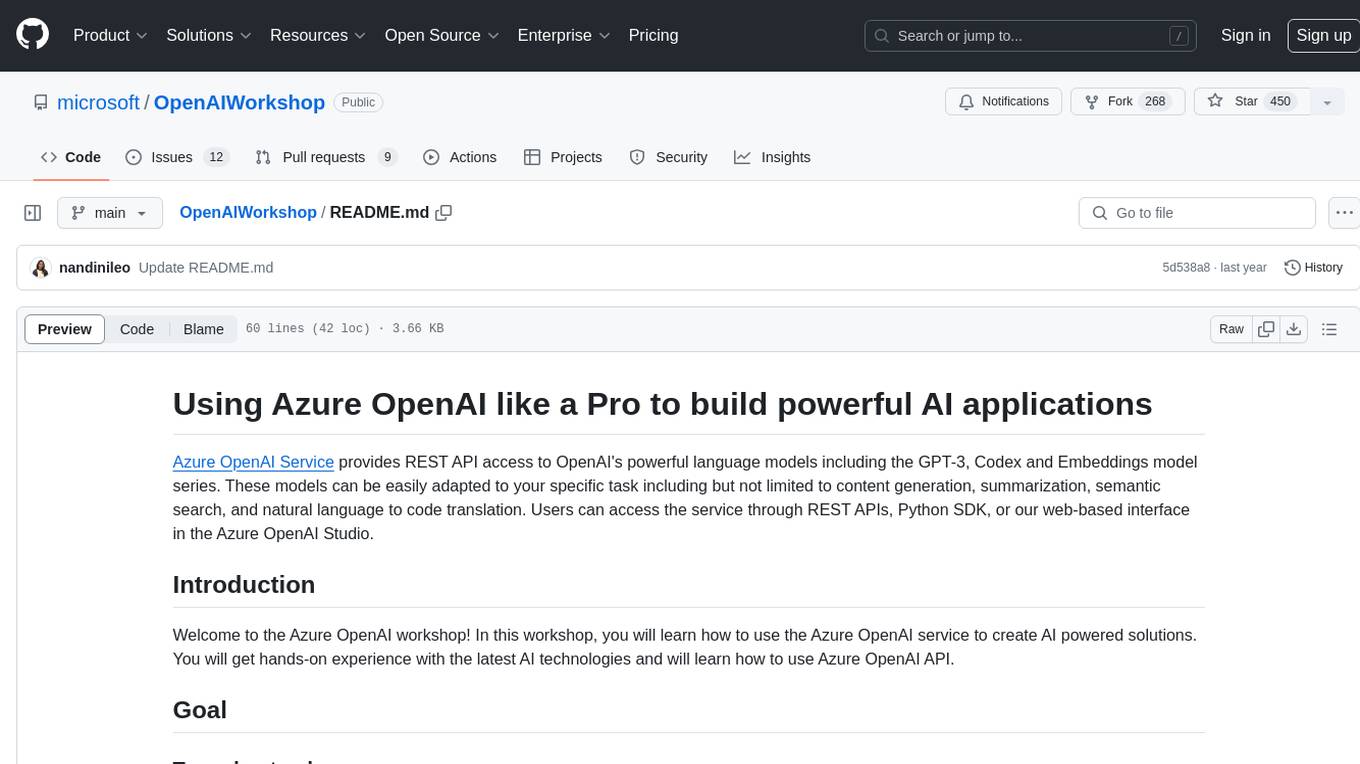
OpenAIWorkshop
Azure OpenAI Service provides REST API access to OpenAI's powerful language models including GPT-3, Codex and Embeddings. Users can easily adapt models for content generation, summarization, semantic search, and natural language to code translation. The workshop covers basics, prompt engineering, common NLP tasks, generative tasks, conversational dialog, and learning methods. It guides users to build applications with PowerApp, query SQL data, create data pipelines, and work with proprietary datasets. Target audience includes Power Users, Software Engineers, Data Scientists, and AI architects and Managers.
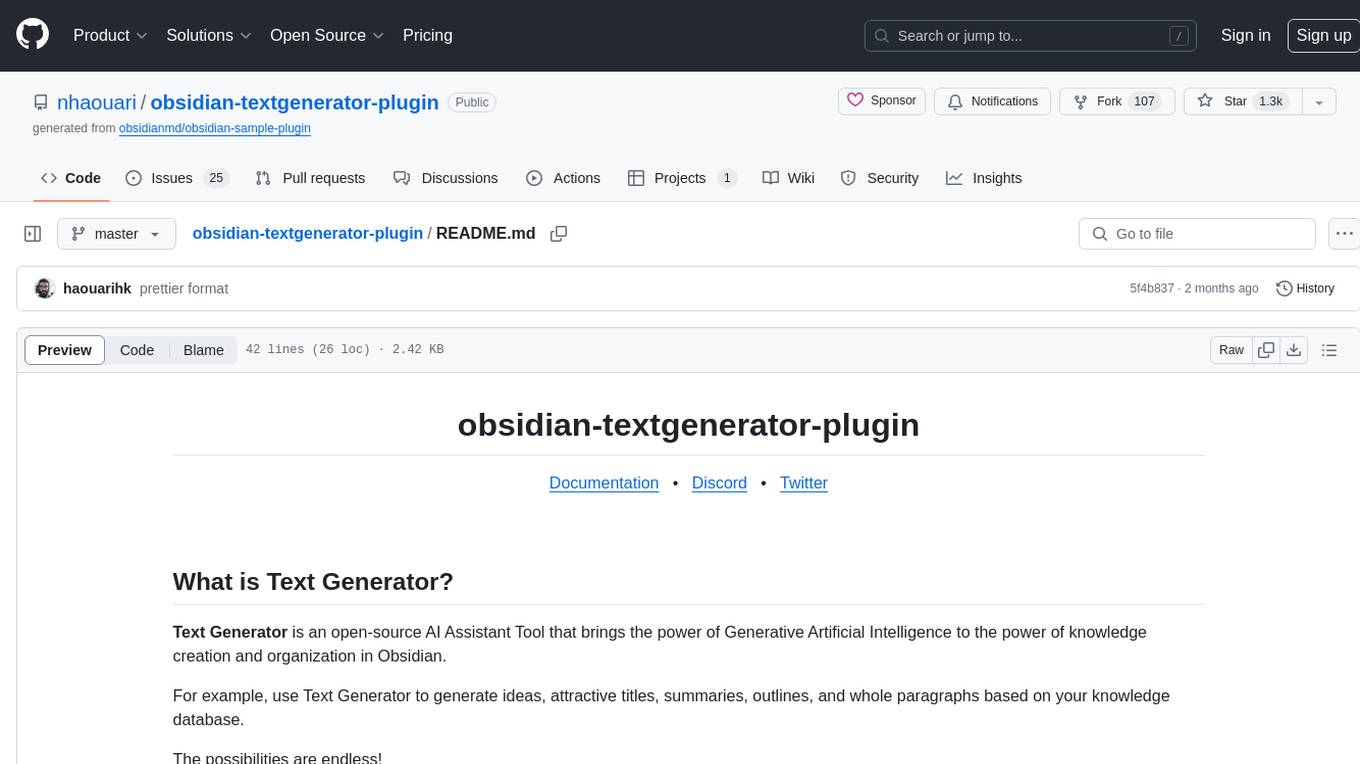
obsidian-textgenerator-plugin
Text Generator is an open-source AI Assistant Tool that leverages Generative Artificial Intelligence to enhance knowledge creation and organization in Obsidian. It allows users to generate ideas, titles, summaries, outlines, and paragraphs based on their knowledge database, offering endless possibilities. The plugin is free and open source, compatible with Obsidian for a powerful Personal Knowledge Management system. It provides flexible prompts, template engine for repetitive tasks, community templates for shared use cases, and highly flexible configuration with services like Google Generative AI, OpenAI, and HuggingFace.
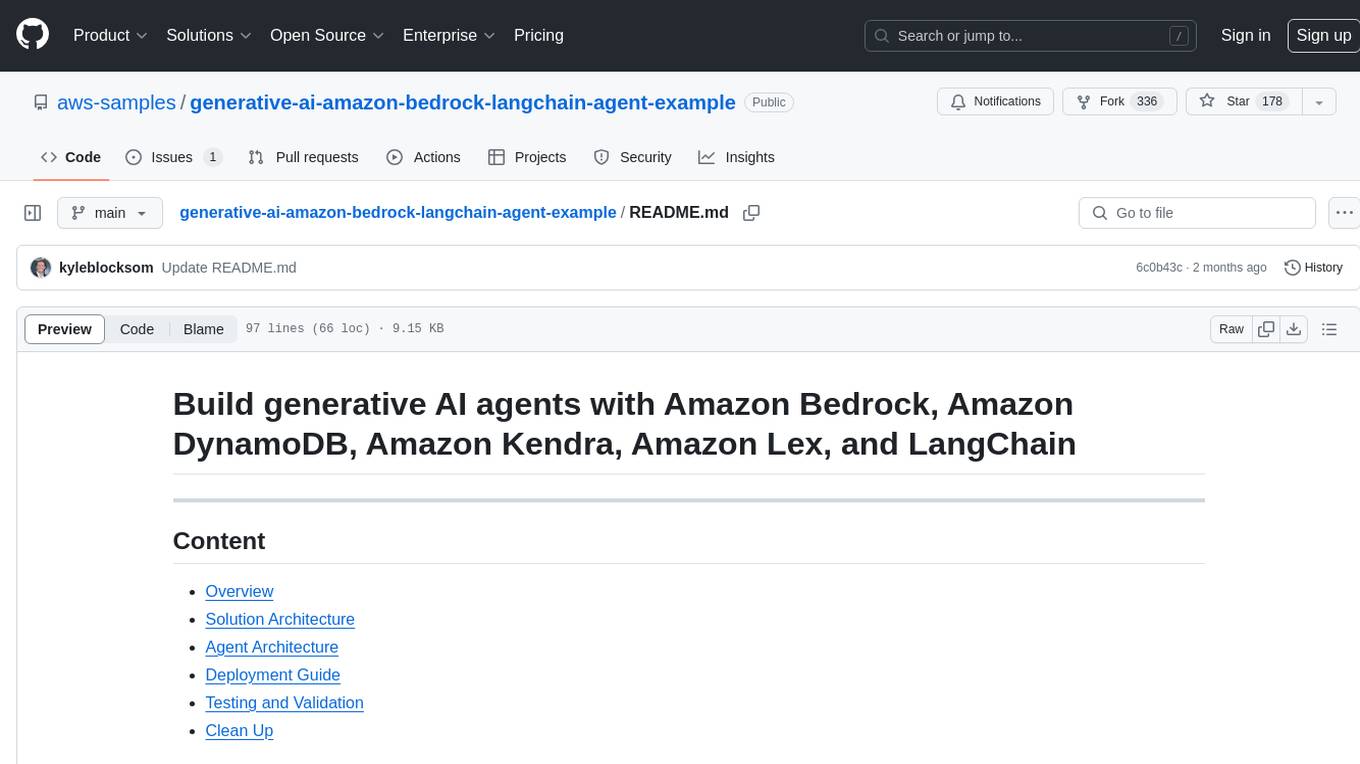
generative-ai-amazon-bedrock-langchain-agent-example
This repository provides a sample solution for building generative AI agents using Amazon Bedrock, Amazon DynamoDB, Amazon Kendra, Amazon Lex, and LangChain. The solution creates a generative AI financial services agent capable of assisting users with account information, loan applications, and answering natural language questions. It serves as a launchpad for developers to create personalized conversational agents for applications like chatbots and virtual assistants.
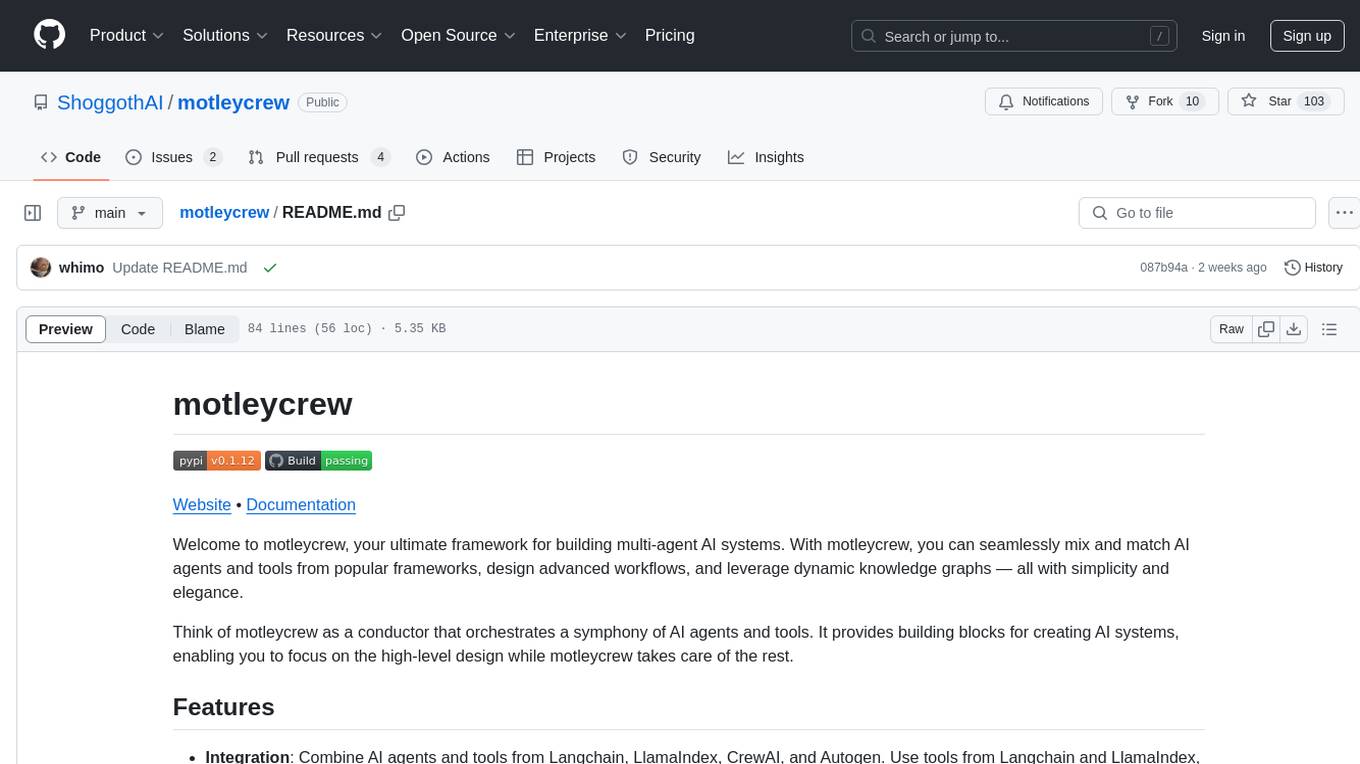
motleycrew
Motleycrew is an ultimate framework for building multi-agent AI systems, allowing users to mix and match AI agents and tools from popular frameworks, design advanced workflows, and leverage dynamic knowledge graphs with simplicity and elegance. It acts as a conductor orchestrating a symphony of AI agents and tools, providing building blocks for creating AI systems and enabling users to focus on high-level design while taking care of the rest. The framework offers integration with various tools, flexibility in providing agents with tools or other agents, advanced flow design capabilities, and built-in observability and caching features.
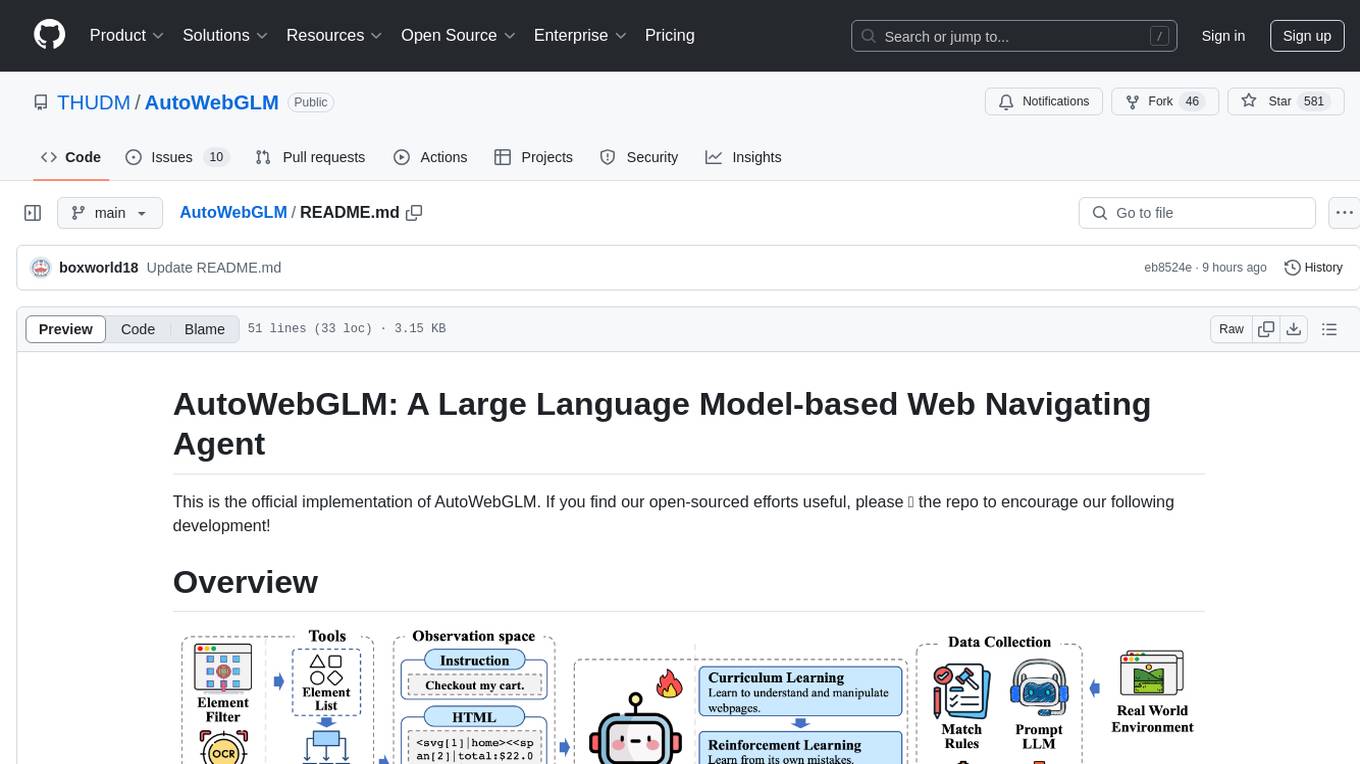
AutoWebGLM
AutoWebGLM is a project focused on developing a language model-driven automated web navigation agent. It extends the capabilities of the ChatGLM3-6B model to navigate the web more efficiently and address real-world browsing challenges. The project includes features such as an HTML simplification algorithm, hybrid human-AI training, reinforcement learning, rejection sampling, and a bilingual web navigation benchmark for testing AI web navigation agents.
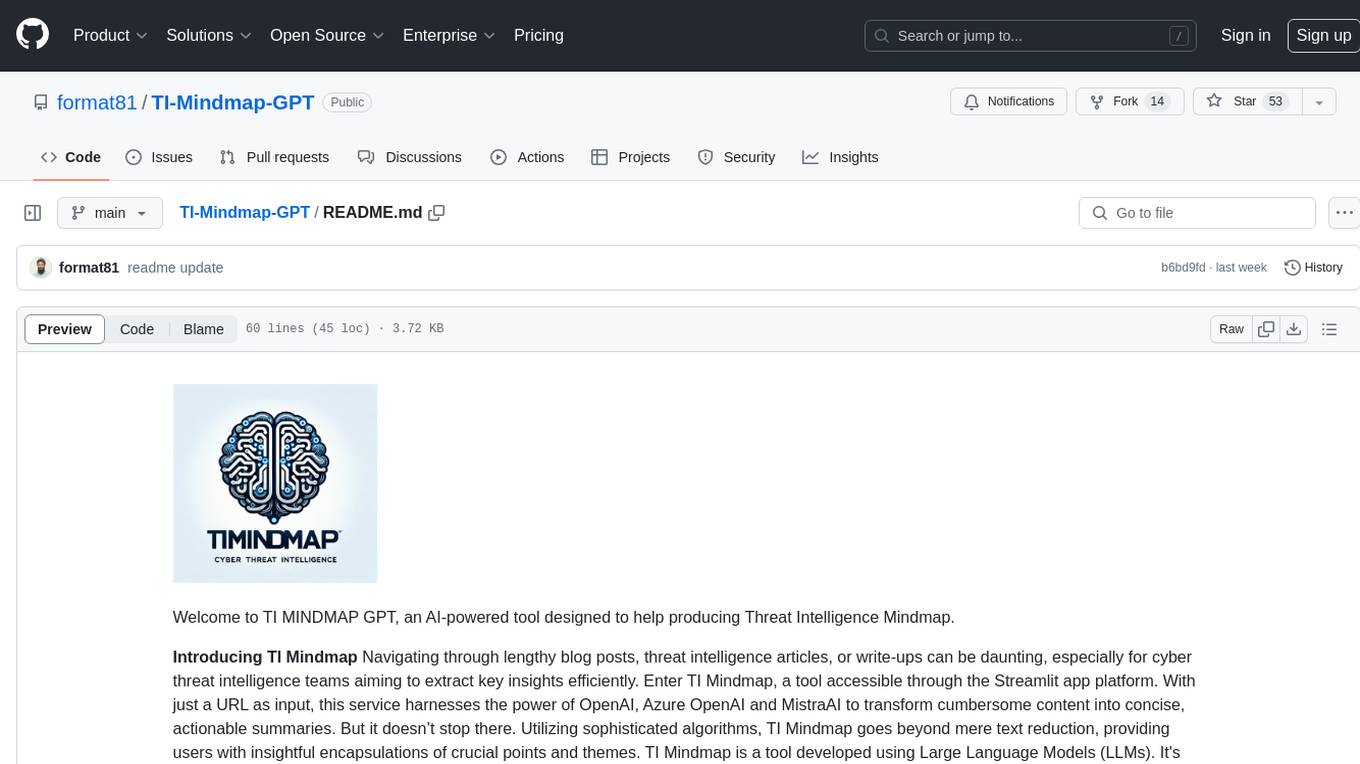
TI-Mindmap-GPT
TI MINDMAP GPT is an AI-powered tool designed to assist cyber threat intelligence teams in quickly synthesizing and visualizing key information from various Threat Intelligence sources. The tool utilizes Large Language Models (LLMs) to transform lengthy content into concise, actionable summaries, going beyond mere text reduction to provide insightful encapsulations of crucial points and themes. Users can leverage their own LLM keys for personalized and efficient information processing, streamlining data analysis and enabling teams to focus on strategic decision-making.

CodeFuse-muAgent
CodeFuse-muAgent is a Multi-Agent framework designed to streamline Standard Operating Procedure (SOP) orchestration for agents. It integrates toolkits, code libraries, knowledge bases, and sandbox environments for rapid construction of complex Multi-Agent interactive applications. The framework enables efficient execution and handling of multi-layered and multi-dimensional tasks.
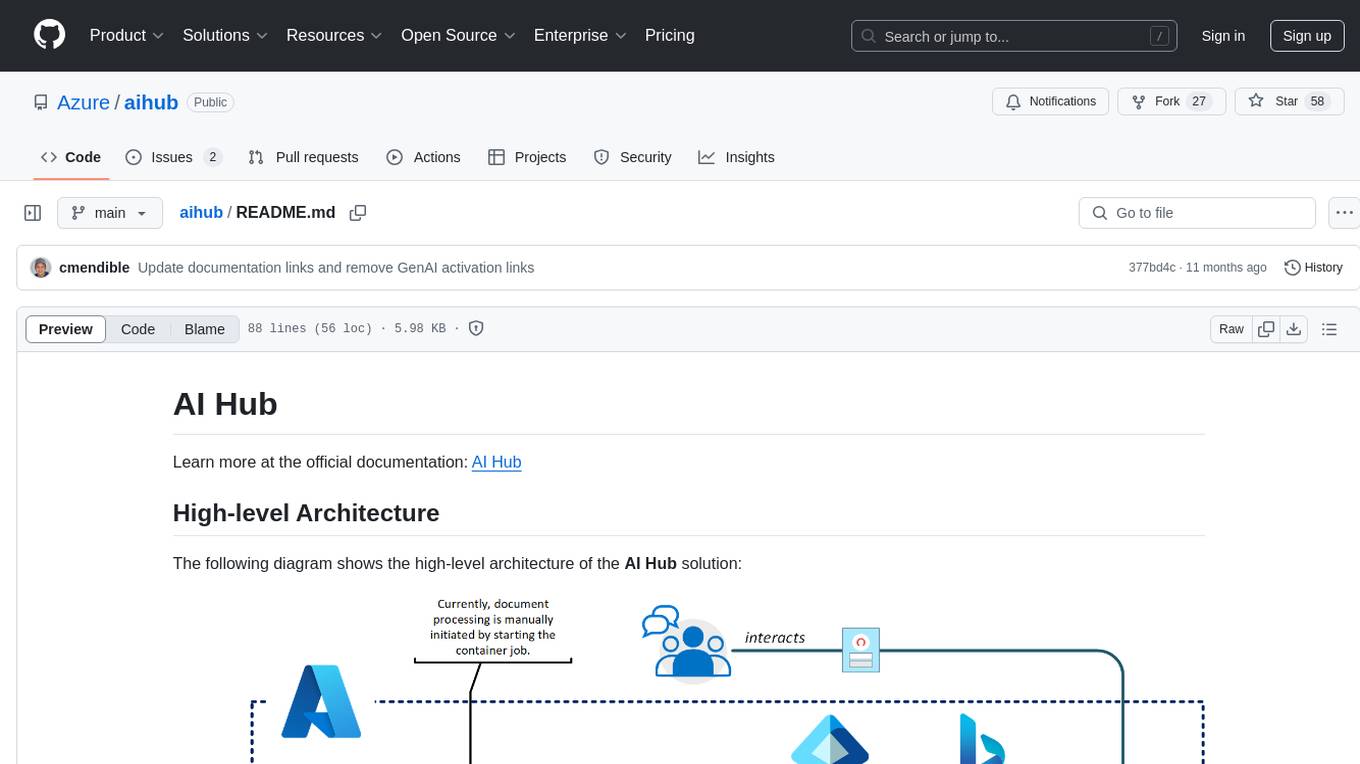
aihub
AI Hub is a comprehensive solution that leverages artificial intelligence and cloud computing to provide functionalities such as document search and retrieval, call center analytics, image analysis, brand reputation analysis, form analysis, document comparison, and content safety moderation. It integrates various Azure services like Cognitive Search, ChatGPT, Azure Vision Services, and Azure Document Intelligence to offer scalable, extensible, and secure AI-powered capabilities for different use cases and scenarios.
For similar tasks

AI-Powered-Resume-Analyzer-and-LinkedIn-Scraper-with-Selenium
Resume Analyzer AI is an advanced Streamlit application that specializes in thorough resume analysis. It excels at summarizing resumes, evaluating strengths, identifying weaknesses, and offering personalized improvement suggestions. It also recommends job titles and uses Selenium to extract vital LinkedIn data. The tool simplifies the job-seeking journey by providing comprehensive insights to elevate career opportunities.

AI-Resume-Analyzer-and-LinkedIn-Scraper-using-LLM
Developed an advanced AI application that utilizes LLM and OpenAI for comprehensive resume analysis. It excels at summarizing the resume, evaluating strengths, identifying weaknesses, and offering personalized improvement suggestions, while also recommending the perfect job titles. Additionally, it seamlessly employs Selenium to extract vital LinkedIn data, encompassing company names, job titles, locations, job URLs, and detailed job descriptions. This application simplifies the job-seeking journey by equipping users with comprehensive insights to elevate their career opportunities.

AI-Resume-Analyzer-and-LinkedIn-Scraper-using-Generative-AI
Developed an advanced AI application that utilizes LLM and OpenAI for comprehensive resume analysis. It excels at summarizing the resume, evaluating strengths, identifying weaknesses, and offering personalized improvement suggestions, while also recommending the perfect job titles. Additionally, it seamlessly employs Selenium to extract vital LinkedIn data, encompassing company names, job titles, locations, job URLs, and detailed job descriptions. This application simplifies the job-seeking journey by equipping users with comprehensive insights to elevate their career opportunities.
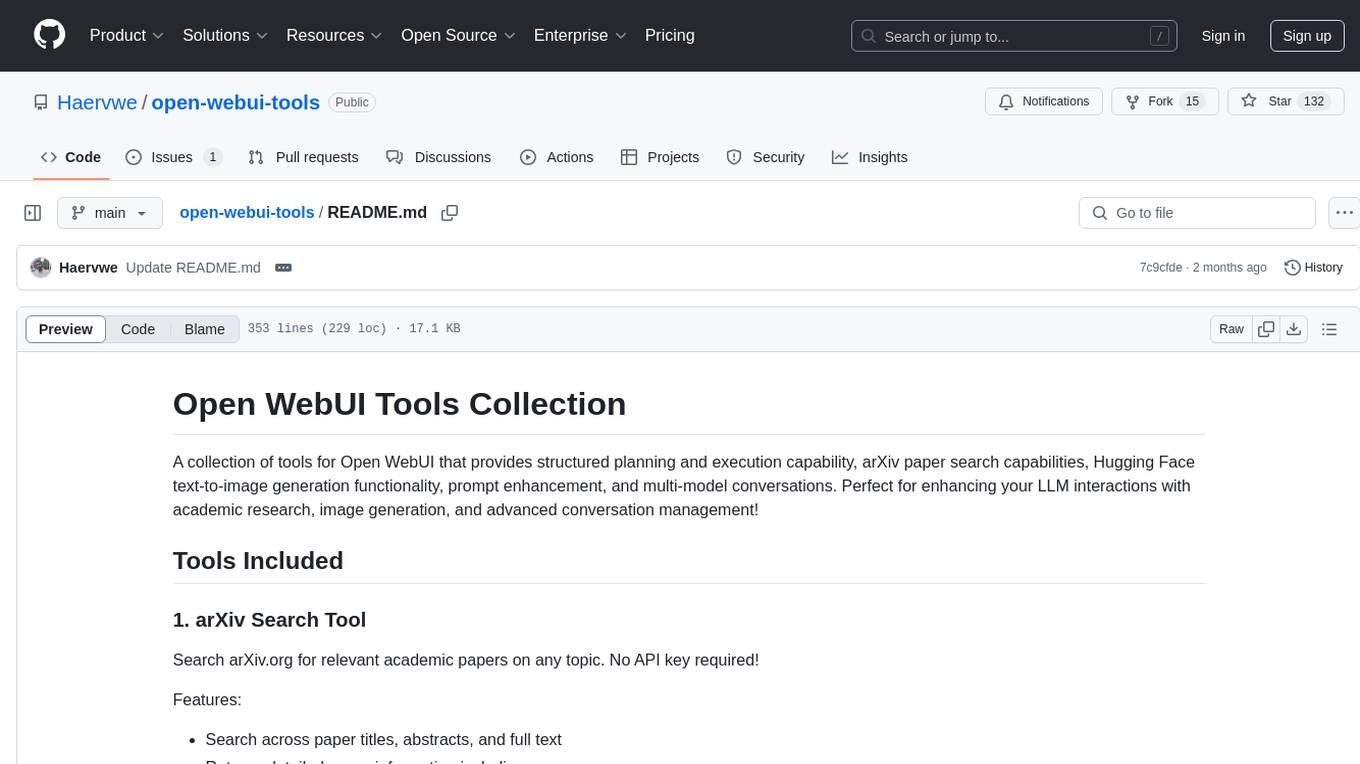
open-webui-tools
Open WebUI Tools Collection is a set of tools for structured planning, arXiv paper search, Hugging Face text-to-image generation, prompt enhancement, and multi-model conversations. It enhances LLM interactions with academic research, image generation, and conversation management. Tools include arXiv Search Tool and Hugging Face Image Generator. Function Pipes like Planner Agent offer autonomous plan generation and execution. Filters like Prompt Enhancer improve prompt quality. Installation and configuration instructions are provided for each tool and pipe.
For similar jobs

weave
Weave is a toolkit for developing Generative AI applications, built by Weights & Biases. With Weave, you can log and debug language model inputs, outputs, and traces; build rigorous, apples-to-apples evaluations for language model use cases; and organize all the information generated across the LLM workflow, from experimentation to evaluations to production. Weave aims to bring rigor, best-practices, and composability to the inherently experimental process of developing Generative AI software, without introducing cognitive overhead.

LLMStack
LLMStack is a no-code platform for building generative AI agents, workflows, and chatbots. It allows users to connect their own data, internal tools, and GPT-powered models without any coding experience. LLMStack can be deployed to the cloud or on-premise and can be accessed via HTTP API or triggered from Slack or Discord.

VisionCraft
The VisionCraft API is a free API for using over 100 different AI models. From images to sound.

kaito
Kaito is an operator that automates the AI/ML inference model deployment in a Kubernetes cluster. It manages large model files using container images, avoids tuning deployment parameters to fit GPU hardware by providing preset configurations, auto-provisions GPU nodes based on model requirements, and hosts large model images in the public Microsoft Container Registry (MCR) if the license allows. Using Kaito, the workflow of onboarding large AI inference models in Kubernetes is largely simplified.

PyRIT
PyRIT is an open access automation framework designed to empower security professionals and ML engineers to red team foundation models and their applications. It automates AI Red Teaming tasks to allow operators to focus on more complicated and time-consuming tasks and can also identify security harms such as misuse (e.g., malware generation, jailbreaking), and privacy harms (e.g., identity theft). The goal is to allow researchers to have a baseline of how well their model and entire inference pipeline is doing against different harm categories and to be able to compare that baseline to future iterations of their model. This allows them to have empirical data on how well their model is doing today, and detect any degradation of performance based on future improvements.

tabby
Tabby is a self-hosted AI coding assistant, offering an open-source and on-premises alternative to GitHub Copilot. It boasts several key features: * Self-contained, with no need for a DBMS or cloud service. * OpenAPI interface, easy to integrate with existing infrastructure (e.g Cloud IDE). * Supports consumer-grade GPUs.

spear
SPEAR (Simulator for Photorealistic Embodied AI Research) is a powerful tool for training embodied agents. It features 300 unique virtual indoor environments with 2,566 unique rooms and 17,234 unique objects that can be manipulated individually. Each environment is designed by a professional artist and features detailed geometry, photorealistic materials, and a unique floor plan and object layout. SPEAR is implemented as Unreal Engine assets and provides an OpenAI Gym interface for interacting with the environments via Python.

Magick
Magick is a groundbreaking visual AIDE (Artificial Intelligence Development Environment) for no-code data pipelines and multimodal agents. Magick can connect to other services and comes with nodes and templates well-suited for intelligent agents, chatbots, complex reasoning systems and realistic characters.